hello.
there is an intimacy to food that is hard to put into words. food has a way of embedding itself into the quiet moments of our lives— a language, a vessel, a thread that ties us to who we were, who we loved, and where we came from. a single dish, the faintest aroma, or even the act of preparing a meal can summon entire worlds: a grandmother's hands kneading dough, a church hall buzzing with shared casseroles, the quiet sacredness of dinner at the family table. food, in its simplicity, holds the weight of our stories.
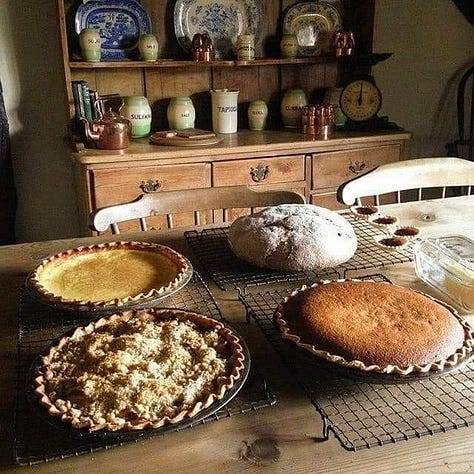
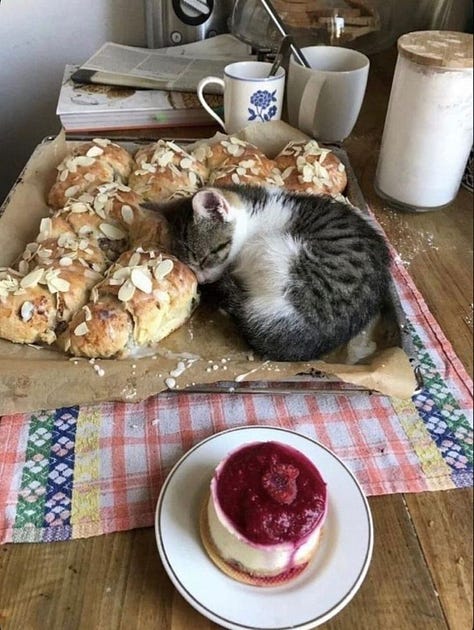

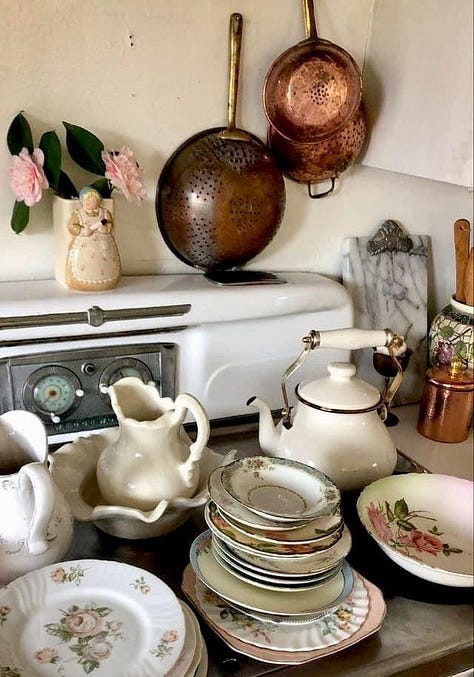
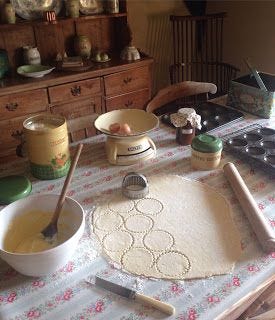
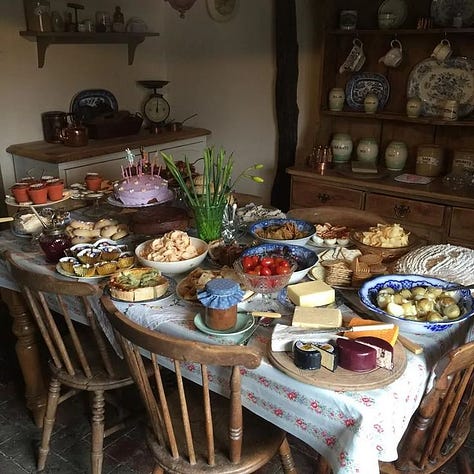
for me, despite not being a religious person, those stories are rooted in my seventh-day adventist upbringing, where faith and food were deeply intertwined. meals in our church weren’t just meals—they were rituals, moments of communion that extended beyond the pulpit. seventh-day adventists are known for their emphasis on health and vegetarianism, but what stands out in my memory isn’t the kale or lentils. it’s the potlucks after church, where long tables buckled under the weight of casseroles, lentil loaves, and jello salads. these dishes, seemingly ordinary, carried with them the quiet labor of love, prepared by hands that often didn’t want recognition.
i remember friday afternoons at the college market, heading there with my grandparents after half days at school. the aisles were piled high with worthington cans of big franks and fried chic, chocolate prune cakes, and walnut wheat sticks fresh from the bakery. medical students, their eyes glazed with exhaustion, shuffled through the cafeteria line in their crisp, short white coats. they’d sit together, sharing haystacks and swapping stories of their grueling days, occasionally pausing to study their histology slides between bites. i’d watch them from a distance, my eyes shimmering with dreams of one day being amongst them, wearing that same coat and carrying that same quiet determination.
sometimes, my grandmother and i would pick up vegetarian corn dogs with a tangy yellow aioli dipping sauce or warm bean and cheese pupusas topped with the most delicious tomato sauce to bring home. those trips were special, and the food always seemed to carry more meaning when it was for family. we’d bring everything back for my grandfather, who’d sit down to a late lunch after finishing with his patients. my grandmother cared for him deeply, as she cared for all of us. once a charge icu nurse, she had left her career to become a stay-at-home mom, raising my mother and uncle, preparing homemade meals every day, celebrating every holiday with thoughtfulness, and stepping in to care for my brother and me whenever my parents couldn’t. her love was quiet but steady, always expressed through the rhythm of her hands—through cooking, through caregiving, through the life she poured into our family. her nursing heart never really retired; it just shifted focus.
despite the warmth of these memories, i often resented other parts of my religious upbringing. i hated going to church and attending a private religious school, and loathed studying scripture. i especially disliked being forced into pathfinders—a sort of seventh-day adventist version of girl scouts without the cookies. the uniform alone was humiliating, making me look like russell from up, and the activities felt burdensome: hiking, community service, endless spiritual curriculum, all wrapped in the guise of adventure. and while girl scouts had the saving grace of cookies, we had gorp, yes, gorp— (good old raisins and peanuts), along with dried fruits, granola, pudding, and fruit cups. at the time, it felt like a pale comparison.
looking back now, though, i find myself clinging to those memories—not the religious instruction or the uniforms, but the sense of community that wove through it all, and the food that was so deeply tied to those experiences. weekend potlucks especially stand out in my mind. they were more than just meals; they were gatherings that embodied a kind of quiet intimacy and care. each dish told its own story, from the jello salads to the lentil loaves, every bite carrying the effort and love of the person who brought it.
what strikes me most is how food became a language in those spaces, one that spoke louder than the sermons ever could. it didn’t matter if i loathed the theology or felt out of place in my uniform—at the table, we were all equal, all nourished by something greater than the food itself. these memories, though complicated, remind me that even in moments of frustration or resistance, there was always something worth holding onto: a shared meal, a warm community, and the quiet comfort of being cared for, even in ways i didn’t yet fully understand.
but if the potlucks fed our collective spirit, my grandmother’s kitchen nourished my soul. her kitchen was the center of the universe, humming with the rhythm of her hands and the smells of her cooking. my grandmother embodied her recipes and she made food the way some people tell stories—naturally, effortlessly, and with an inherent understanding of what would resonate.
one of my most treasured heirlooms from her isn’t a piece of jewelry or a piece of furniture—it’s the cookbook she wrote with her best friends while my grandfather was in dental school. it’s spiral-bound and unassuming with a deep cherry red cover, hand-written notes in the margins and stains on the pages that feel like fingerprints left by time. it isn’t just a collection of recipes; it’s a map of her life and, by extension, mine. flipping through its pages feels like hearing her voice, guiding me through the steps of a pie crust or the perfect vegetable soup. her artichoke parmesan streusel, egg strada casserole, and cheesy walnut balls are some of my favorite recipes of all time. and despite what you may assume about jello salads from the 1950’s, my grandmother’s green jello salad is still one of my favorite sweet treats i look forward to every holiday season.
church cookbooks carry a similar kind of magic— humble, homemade compilations of recipes from women whose names you might never know, but whose cooking you’ll never forget. each recipe comes with a story: perfect for sunday lunch, or a favorite at family picnics. the syntax, dialect, and handwriting from their time still fascinates me to this day. there’s an intimacy in those annotations, a sense that food is not just sustenance but a marker of time, a bridge between people.
food has a way of keeping us tethered to the past while pulling us forward. the table is not just a physical space, but rather, a space where we come together, grieve, laugh, and learn what it means to be part of something bigger than ourselves.
there is, of course, a bittersweetness to this connection. food has a way of reminding us of what we’ve lost: the people who are no longer here, the traditions that fade with time, the places we can no longer return to. but even in that loss, there is something profoundly beautiful. cooking a dish taught to you by someone who is gone feels like a dialogue with their memory, a way of keeping them close even when they are far away. every recipe passed down, every meal shared, becomes a love letter to the past.
recently, i’ve started incorporating these reflections into my journaling practice. not just writing about the meals, but preserving the small, tangible pieces of them—pressed flowers from a picnic, stained recipe cards, polaroids of a beautifully set table. these fragments become more than keepsakes; they become bookmarks in the story of my life.
food is, in so many ways, a storyteller. it carries the weight of culture, identity, and relationships. it connects us to the people we love, the places we’ve been, and the versions of ourselves we might otherwise forget. the table, then, becomes more than just a place to eat. it becomes a space to leave pieces of ourselves for others to find, a place where love, memory, and identity collide.
in true milk fed fashion… some book and film recommendations that embody the above.
but, before i do that… a playlist i made that feels nostalgic and reminiscent of this letter.
books
kitchen by banana yoshimoto
a tender and melancholic novel that explores the deep connections between food, love, and loss through the lens of a young woman navigating grief and healing.
the secret lives of church ladies by deesha philyaw
a stunning collection of stories that intertwines faith, food, and relationships, capturing the quiet yet profound ways these themes shape identity and memory.
tender at the bone by ruth reichl
a charming, witty memoir that follows the author’s journey to understanding herself and others through food, family, and relationships.
an everlasting meal by tamar adler
a poetic reflection on cooking and its ability to connect us to the past, the present, and the people we share meals with.
the gastronomical me by m.f.k. fisher
an exquisite collection of essays blending food, travel, and the raw, intimate moments of life. fisher’s reflections capture the deep relationship between food and memory.
crying in h mart by michelle zauner
a deeply moving memoir that uses food as a vehicle to explore grief, identity, and the love between a mother and daughter.
sweet bean paste by durian sukegawa
a quiet, tender novel about the unexpected friendship between a struggling dorayaki shop owner and an elderly woman with a secret past. the act of making and sharing food becomes a pathway to healing and understanding.
home cooking by laurie colwin
a warm and inviting series of essays on cooking, family, and the comforting rituals of sharing food with loved ones.
the art of eating by m.f.k. fisher
a classic, expansive look at how food shapes culture and memory, blending philosophy, history, and personal anecdote.
films
babette’s feast (1987)
a danish masterpiece about how food becomes an act of self-expression, love, and gratitude, transforming the lives of those who share it.
little forest (2018)
a gentle korean film about a woman returning to her rural hometown, finding solace in nature and cooking simple, heartfelt meals with ingredients she grows herself.
julie & julia (2009)
a delightful, heartwarming film about the intersection of food, storytelling, and the connections we build through the act of cooking.
ratatouille (2007)
a whimsical yet profound exploration of creativity, passion, and the memory-laden power of food to transport us to childhood and beyond.
mrs. harris goes to paris (2022)
a warm and optimistic story that, while not food-centered, captures the beauty of pursuing simple joys and creating connection in everyday life.
the hundred-foot journey (2014)
a rich story about cultural collision and harmony, where food serves as the bridge between traditions, family, and identity.
jiro dreams of sushi (2011)
a stunning documentary about the artistry of food and the meticulous dedication that transforms meals into vessels of memory and legacy.
big night (1996)
a heartfelt tale of two brothers running an italian restaurant, where one extraordinary meal becomes a celebration of love, loss, and family.
moonstruck (1987)
a romantic classic full of family dinners, hearty italian food, and the warm chaos of love and life.
eat drink man woman (1994)
a taiwanese classic that blends family dynamics, generational conflict, and food as a metaphor for connection and reconciliation.
tampopo (1985)
a quirky japanese film that celebrates the joy and culture of food while exploring its connection to love, life, and community.
chocolat (2000)
a magical and sensual film where chocolate becomes a catalyst for transformation, connection, and healing in a small, judgmental town.
okay, that’s all i have for you today.
if you’re not ready to become a paid subscriber and you have the capacity to leave a tip, that would be so appreciated.
i love you.
bye.
(follow ig, tiktok, youtube, pinterest and spotify for more)






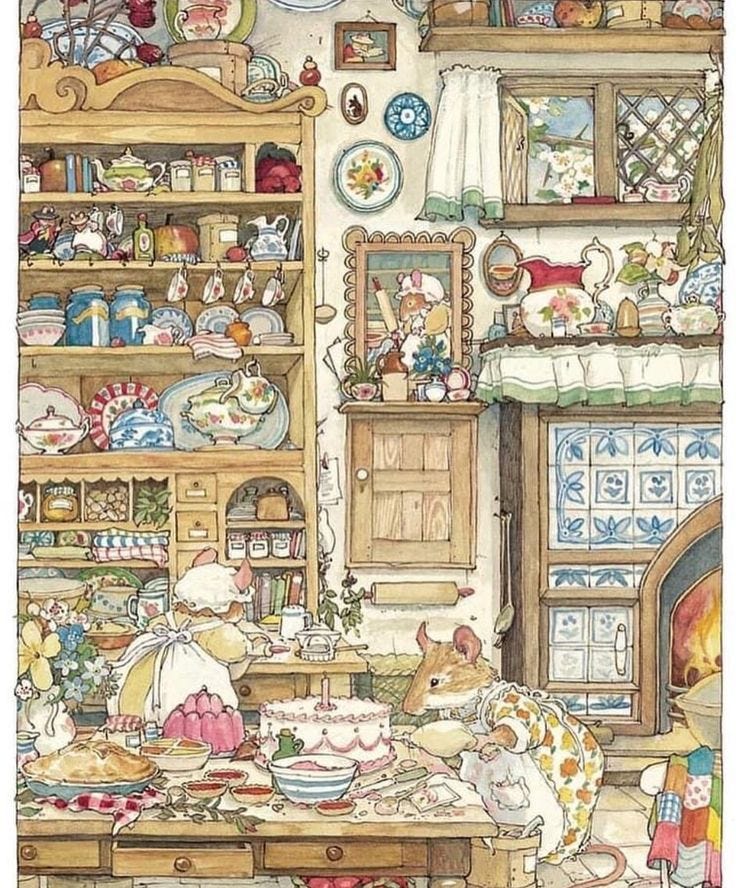
Yes! As the daughter of an immigrant, food is one of the main things that keep me close to my roots. When I return to my home country (I wasn't born there, but it definitely feels like a part of me), it is always the first comfort I crave.
It's so sweet to hear that you have such an heirloom from your grandmother as a cookbook. My grandmother passed away suddenly a couple of years ago and I don't think I've ever eaten something remotely similar to her cooking since then. I wish I could relive those moments in the kitchen with her as well, or have more samples of it like the handwritten recipes that were passed down to you.
I hope you have a wonderful Sunday
Such a beautiful piece I'll definitely be reflecting on as I cook this week 🤍 Food really is the grand connector finding a way to ground us to who we are and once have been